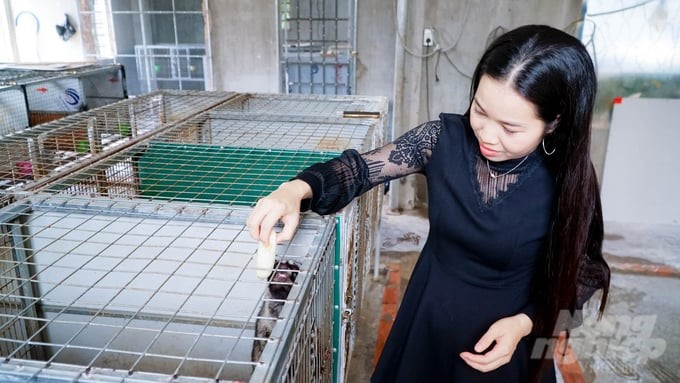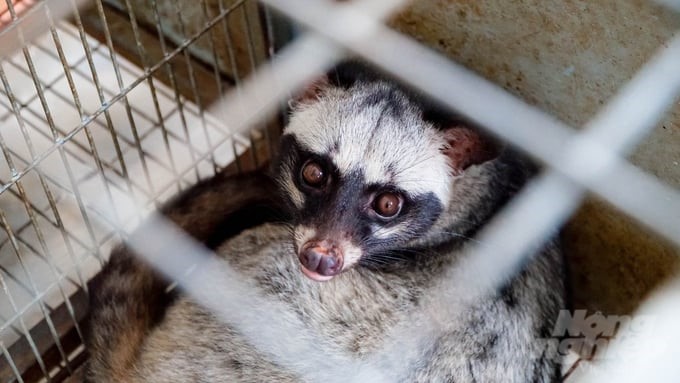November 27, 2025 | 03:20 GMT +7
November 27, 2025 | 03:20 GMT +7
Hotline: 0913.378.918
November 27, 2025 | 03:20 GMT +7
Hotline: 0913.378.918

After nearly two years of raising civet, Ms. Nhung's farm is now profitable by selling breeds and civet for meat. Photo: Le Binh.
The civet farm of Ms. Nhung and Mr. Quy (Phu Dung hamlet, Phu Binh commune, Tan Phu district) showed surprising effectiveness. With 40 parent civets, Ms. Nhung and her husband currently have a stable income. Ms. Nhung’s model is one of the most effective wildlife raising models in Tan Phu district and is being introduced and replicated by the District Animal Husbandry and Veterinary Station.
Mr. Nguyen Phuoc Quy shared that after the COVID-19 pandemic, he and his wife stopped doing business and learned about raising civet at home. After learning from many different sources, the couple decided to buy 10 pairs of parents to try raising.
After nearly two years, Mr. Quy and his wife's total civet herd has now reached 40 heads. In the first year of raising civet, Mr. Quy recovered his capital and is earning a profit of about VND 300–400 million each subsequent year.
Currently, civets are sold to the market by Mr. Quy and Ms. Nhung in two different forms and prices. Baby civet breeds of about 2.5 months old cost VND 8 million/pair, while civets for meat are sold for VND 1.5–1.7 million/kg, depending on the time.
“A baby civet from birth to maturity and reproduction is 10–12 months old. Each year, civet will lay 2 litters, with about 4–12 babies. Civet is pregnant for about 60 days before giving birth. Therefore, the potential for raising civet breeds is quite high," Ms. Nhung assessed.

Civet is a wildlife species that is easy to raise, has a high price, and is rarely susceptible to diseases. Photo: Le Binh.
Civet is a wildlife species used as a rare and precious medicinal herb. Not only that, civet is also known as a delicious specialty dish with sweet and tender meat, so it is very favored in restaurants.
To prevent disease issues, Mr. Nguyen Phuoc Quy is gradually transforming to raising civet with biological bedding, which helps decompose waste and minimize odors. He and his wife also take advantage of this bedding to fertilize durian. In addition, tourists who want to visit must be disinfected with a solution and step through the lime pit to minimize cross-infection.
According to the instructed technique, for every square meter of the barn, Mr. Quy uses 1 quintal of rice husk and sawdust (50/50) to make bedding and uses biological products of 100 grams of probiotics, 1.5 kilograms of corn starch, and 10 liters of water to brew well for fermentation.
“Since receiving technical guidance from the STOP Spillover project and the District Veterinary Station, my civet farming facility no longer has wildlife’s characteristic odor. Previously, when there was no bedding, every day I had to wash the cage, which was very tiring. With this biological bedding, we only need to replace another every 3–4 months," Mr. Quy shared.
Because civet is a wildlife species, raising this species is also "issued with birth certificates" and controlled by the ranger force. This is a mandatory requirement. Therefore, for each breed sold to the market or for meat to sell to restaurants, the farm of Ms. Nhung and her husband also provide all valid documents. It is planned that in 2024, Mr. Quy and his wife will increase the number of parent breeds to 100 to meet the increasing demand for farming and consumption.
Mr. Le Tan Viet, Head of the Tan Phu District Animal Husbandry and Veterinary Station, highly appreciated the effectiveness of the civet farming model of Mr. Quy and his wife. Not only does it bring high economic efficiency, but this is also a model that applies disease safety techniques very well.
“Although this is a fairly new farming model in Tan Phu district, it quickly proved its effectiveness. We also closely follow and guide civet farming households in general so that the livestock can grow well and be disease-free. This partly helps the value of civet to be enhanced and more sustainable," said Mr. Viet.
According to the Head of the Tan Phu District Animal Husbandry and Veterinary Station, civet is also a quite fastidious species, so it is also necessary to pay attention to their living habits so that the livestock can grow well. Specifically, during the breeding period, civets like darkness and quietness with noise limitations. In addition, eating issues also need to be paid attention to because they will directly affect the livestock's health.
“Civet is very weak in the digestive tract, so the food source must be clean; the food tray should be individually numbered for each head in each cage and should be cleaned every day. Civet's favorite foods are bananas, coffee, etc. Our farm also feeds civet with carefully cooked fish, chicken, and duck to supplement nutrition and adapt to available raw materials," Mr. Le Tan Viet shared.
Translated by Huyen Vu Thu

(VAN) Tay Ninh’s livestock sector is undergoing a major transformation, applying high-tech, closed-loop circular models to build sustainable value chains.
/2025/11/26/3627-4-082628_818.jpg)
(VAN) From a small café on the red basalt highlands, Le Van Hoang started a business with clean coffee, building Enjoi Coffee into a symbol of organic agriculture in the Lam Dong plateau.
/2025/11/25/0045-1-135246_13.jpg)
(VAN) Ca Mau is researching a model of sea-encroaching embankments combined with viaducts and logistics service zones, aiming both to prevent erosion and create land funds for marine economic development.

(VAN) The information was shared at the seminar 'Urban Agriculture - Solutions for Developing Green Spaces,' organized by the Kinh te & Do thi Newspaper and the Biotechnology Center of Ho Chi Minh City.
/2025/11/19/4141-2-132831_216.jpg)
(VAN) One of Japfa's outstanding solutions is implementing digital transformation and artificial intelligence (AI) to optimize operations, enhance productivity, and advance sustainable development.
/2025/11/19/4847-1-093540_448.jpg)
(VAN) The Gia Lai Provincial People’s Committee had a working session with the delegation of the U.S. Department of Agriculture, the State of Idaho, and representatives of the State's leading enterprises.

(VAN) Ca Mau has a sufficient foundation to become a strong regional aquaculture center, where production integrates the economy, the environment, and the lives of the people.